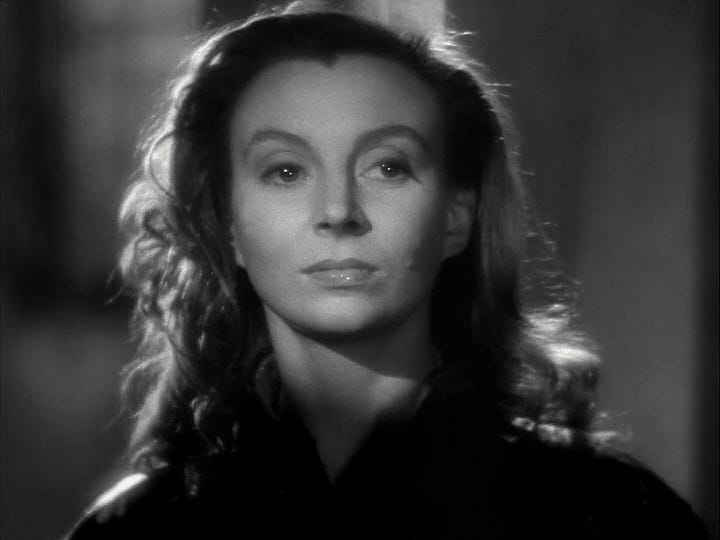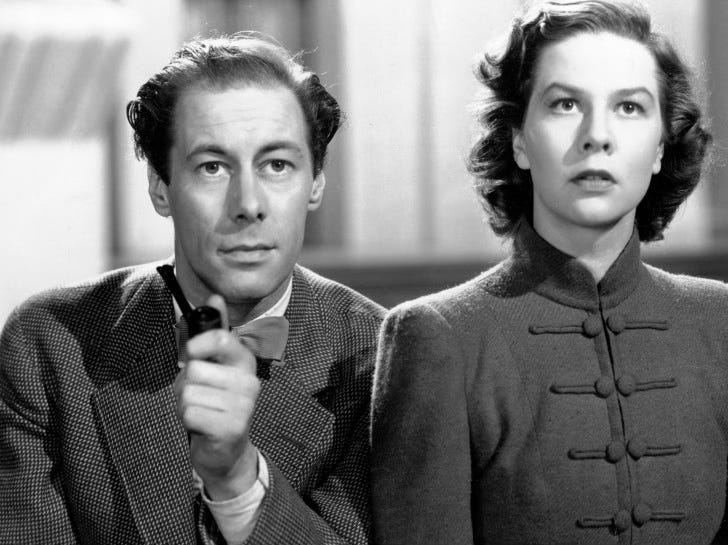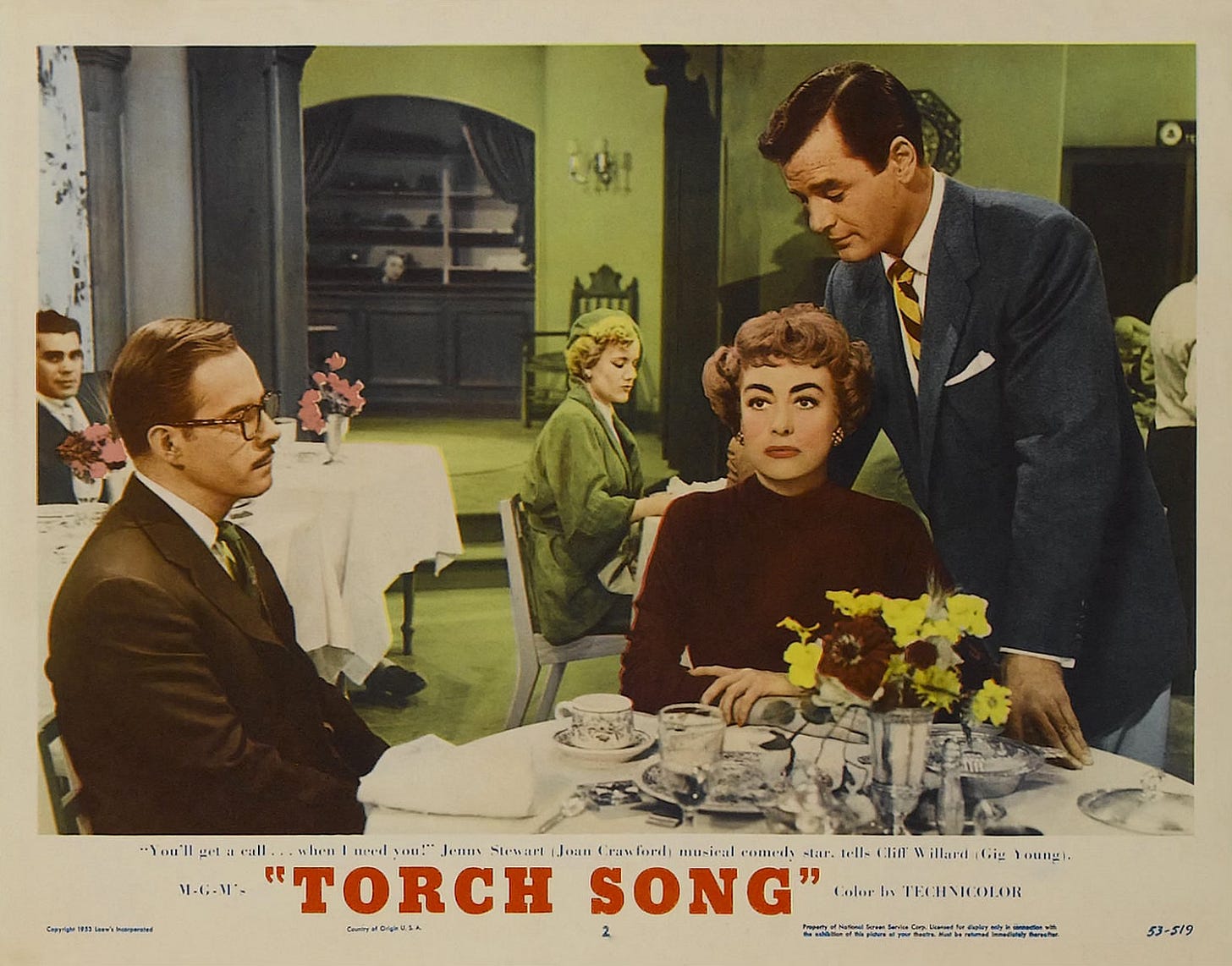A Terminal Case
[more notes on punctuation!]
The fifteenth—two days ago as I write this—was the birthday of the glorious actress Wendy Hiller, and any number of us marked the day by celebrating our favorite performances of hers, including, for a start, her 1938 film debut as Eliza Doolittle in George Bernard Shaw’s Pygmalion, in which she and Leslie Howard as the martinet grammarian1 Professor Henry Higgins are several degrees beyond unsurpassable, and in which Hiller particularly triumphs in one of the funniest scenes ever written and committed to film, Eliza’s society debut at the home of Prof. Higgins’s2 mother, which culminates in the anxiously eager former flower girl’s climactic and, for its era, shocking faux pas,3 a cheerily delivered “Not bloody likely.”4
One should also not sleep on, as the young folk apparently say, Major Barbara, Hiller’s 1941 GBS follow-up, in which this time she appears opposite Rex Harrison, the eventual, as I probably don’t need to tell you, musical(ish) Prof. Higgins of My Fair Lady,5 to say nothing of Robert Morley, Robert Newton, Sybil Thorndike, the apparently inescapable Miles Malleson,6 the heavenly Marie Lohr (so endearingly sensible and nearly unflappable as Mrs. Higgins in the above-mentioned Pygmalion film) as Lady Britomart, a cherishably young Deborah Kerr, and even, in a bit part, that future Alfred Doolittle7 for the ages, Stanley Holloway.
And we, or at least I (and after all this is my essay, and yes we’re getting to the punctuation in just a bit; keep your shirt on), cannot and will not neglect the imperious Princess Dragomiroff in Sidney Lumet’s 1974 film of Agatha Christie’s Murder on the Orient Express.8
All that said, many people’s favorite Wendy Hiller film—and for a not insignificant subset of those many people their favorite film of all time, I find—is 1945’s I Know Where I’m Going!, the Michael Powell–Emeric Pressburger9 triumph that is both swooningly romantic and intensely grounded, which combination may account for the magical spell it casts on its viewers, though one must also take into account, besides the superb Wendy and the superb Hebrides scenery, the eerie enchantress Pamela Brown.10


And at last we (or at least I) arrive at the punctuational point of this piece: that terminal ! in the title I Know Where I’m Going! and how to cope with it.
First, though many writers, I find, freeze up at the potential spectacle of two marks of punctuation back to back (unless one of them is a quotation mark),11 one can certainly—indeed, one must, as I’ve done above—follow an ! in a title (or even a ?, should one show up) with a necessary comma (as necessary).
That said, if one is concluding a sentence with a !-concluding film (or play or book or TV series) title, the period12 goes away. That is:
Last night we watched I Know Where I’m Going!
Why? Because the likes of
Last night we watched I Know Where I’m Going!.
would be bloody hideous. The correct version may seem ever so slightly illogical,13 but do please take my word for it: A single piece of terminal punctuation here does the job perfectly nicely. (The reader will get that it’s the end of a sentence; readers get a lot more than they’re often given credit for.)
And as to (trust me, I know how you scamps think)
Have you ever seen I Know Where I’m Going!?
or even
Oh, I absolutely adore I Know Where I’m Going!!
my advice is, emphatically: Don’t. You’re better than that. Find another way to do it. There’s always another way to do it.
For the record, I trust that you’re also noting how, in those two examples just given that you will never, ever re-create, or I will haunt you not only from beyond the grave but well before, the ! that belongs to the film’s title is in italics (like the rest of the title, natch), and the ? and the ! that belong to the overall sentence are set in roman.
Now, then, as to the pile-up of punctuation demanded by a sentence like
The songs in Lionel Bart’s musical Oliver! include “Oliver!,” “Where Is Love?,” and “Who Will Buy?,” to say nothing of “Food, Glorious Food” and “Reviewing the Situation.”
I can only imagine that the eyes of at least some of you are balking and/or twitching at those !,” and ?,” combo packs. They are, however, entirely comme il faut.14 (Plus there’s no other way to do it, is there.)
Of course, if you are a Brit or Brit-adjacent, you’ll probably end up with
The songs in Lionel Bart’s musical Oliver! include ‘Oliver!’, ‘Where Is Love?’, and ‘Who Will Buy?’, to say nothing of ‘Food, Glorious Food’ and ‘Reviewing the Situation’.
And if you like that sort of thing, that is the sort of thing you’ll like.
Just for fun, and to fuel your nightmares tonight:
“Estelle,” Adela exclaimed, “did you hear that in the middle of dinner, Byron exclaimed, ‘Are you trying to tell me that there’s a song in Oliver! called “Oliver!”?’?”
Sleep tight.
The Usual Fine Print
Thank you for being here, thank you for following, thank you for subscribing. All of this substackery of mine is free and will remain that way. Which means that if you have chosen to contribute to its and my upkeep,15 in larger or smaller ways, you are doing something you don’t have to do, which makes your generosity that much more resonant, and I am profoundly grateful. If you’re not yet part of that contributing crew and there’s a part of you that’s thinking “You know what? I like this guy” and you choose to join the crew, I will be eternally (or at least monthly or annually) in your debt.
Benjamin
No, you shut up.
I’m trusting that you haven’t missed all the hubbub and hoopla these last few days over the possessive form of words and especially names ending in sibilants, but just in case you have missed it I can hook you up. (Good gosh, even the links have links.)
I’m reminded of once encountering, in some manuscript or bit of flap copy, a reference to a “social faux pas,” and I was only too happy to point out that faux pas are, by definition, social.
Funnily enough, one of the other funniest scenes ever written and committed to film also involves a female impostor derailing an intendedly sedate social gathering. I speak of course of the divine Irene Dunne’s appearance as Cary Grant’s fictitious ne’er-do-well sister, Lola, in The Awful Truth. Perhaps there’s a monograph to be written on this.
It’s perhaps worth noting that by the time 1913’s Pygmalion had been adapted and evolved into 1956’s Broadway sensation My Fair Lady, “bloody” had lost much/most of its shock value, particularly for American audiences that might never have been aware of its shock value at all, and thus the onetime gasp-inducing “Not bloody likely” was replaced with Eliza’s Ascot exhortation “Come on, Dover, move your bloomin’ arse.”
Also, apropos of nearly nothing (not that that’s ever stopped me), one of the more absurd factoids—in the original Norman Mailer–ian* sense of the word—about My Fair Lady is that its title is meant to be a play on words on how Cockney Eliza would pronounce “Mayfair lady.” I don’t know who thinks these things up, but there’s nothing more complicated about the origin of the musical’s title—which had preliminarily, variously been “Liza,” “My Lady Liza,” “Come to the Ball,” and maybe even “Fanfaroon” (!)—than that it’s, as you and I know well, the concluding line of each chorus of “London Bridge Is Falling Down” and that the show’s creators eventually, if somewhat begrudgingly, thought it would look OK on a marquee.
And Cockney Eliza would not pronounce “Mayfair lady” as “my fair lady” anyway, so: 🤷🏻♂️.
*En dash alert!
It’s one of my private little jokes, perhaps amusing mostly or only to me, that the careers of the actor Miles Malleson and the conductor Muir Mathieson overlapped in so many British films (upwards of forty, as I recall) that even they couldn’t tell each other apart, and I’m pleased to report that Mathieson does indeed conduct the London Symphony Orchestra playing William Walton’s Major Barbara score.
In My Fair Lady he’s referred to as Alfred P. Doolittle, though I can’t, after an admittedly perfunctory bit of googling, find him with a middle initial in Shaw’s original script. Neither can I divine what the P. stands for. Perhaps another monograph is in the offing.
Many people dote especially on the exchange between Hiller and Albert Finney’s Hercule Poirot:
Poirot: You never smile, madame la princesse?
Madame la princesse: My doctor has advised against it.
I myself am especially fond of the princess’s exacting dinner request:
Madame la princesse: You will have the goodness to serve me the poached sole with one new potato and a small green salad with no dressing.
Which is certainly the best meal order since Joan Crawford barked for “Lobster Newburg and coffee” in the ruthlessly unforgettable Torch Song.
But I digress. For a change.
Another en dash!
The eventual object of Wendy’s affection is played by Roger Livesey, who’s never really been my cup of cock-a-leekie, but those who love him love him intensely. It takes, as always, all kinds.
Or, I guess, a parenthesis.
Full stop for you folk who like to call periods full stops.
Welcome to English.
Have we sufficiently covered that once a foreign-language-derived word or phrase is domesticated into English, it loses the italics it might have borne had it still been considered, well, foreign? I think we have. But as with most copyeditorial points, it bears repeating. And of course I demonstrated this point already, above, with faux pas, which I’ll bet you didn’t notice at all.







I love "I Know Where I'm Going!" (and I don't know how to italicize here). I could add more exclamation marks - and I'm fully authorized, after my 14 years as a K-5 librarian.
And I'm with you re Roger Livesey. I do think of myself as Brit-adjacent (Anglo-Irish parents, American citizen since age 10), but it feels more like the tangential kind.
That movie cast a spell on me and my husband. And after we were married, and he was working for a Houston nonprofit to do with film and video, the MFAH brought Powell to talk as part of a film series and we saw it again. He was very old, still energetic, and so interesting.
I opened your latest newsletter with tears of joy. I'm old and cry almost daily, but still....
This is so so good.
I live for your footnotes.